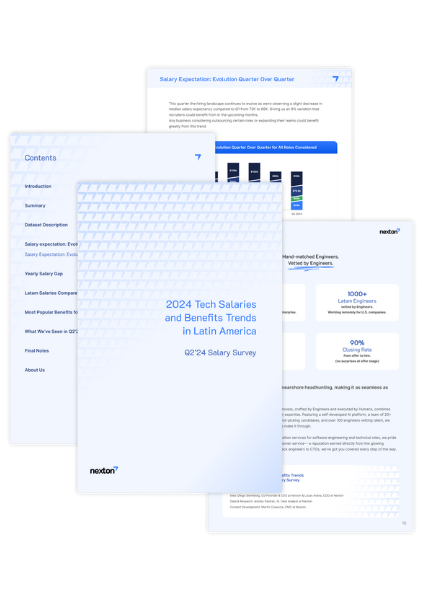If you're a Latin American engineer, you might find yourself looking for a remote position in a U.S. company. To that, we say: Welcome! You're in the right place!
In this ever-evolving tech landscape where LATAM is producing over 1 million tech graduates per year, upskilling isn’t just an option; it’s a necessity.
So let’s dive into how you can elevate your career and become the tech hero every U.S. employer is looking for.
Why Upskilling Matters in Tech
Before we jump into the "how," let's talk about the "why." The tech industry is constantly changing—new languages, frameworks, and tools are emerging every day. To stay relevant, you need to keep your skills sharp and adapt to the market demands. Here’s why upskilling should be at the top of your to-do list:
- Increased Job Opportunities: U.S. tech companies are on the lookout for candidates who are not only skilled but also adaptable. By expanding your skill set, you increase your chances of landing that dream job.
- Career Advancement: Upskilling opens doors to new roles and responsibilities. Whether you want to climb the corporate ladder or pivot into a new specialization, ongoing education is key.
- Competitive Edge: In a global talent pool, standing out is crucial. By investing in your professional development, you position yourself as a top candidate for U.S. employers.
Identifying the Skills You Need
To upskill effectively, you first need to identify which skills are in demand in the U.S. tech job market. Here are some of the hottest skills currently sought by
employers:
1. Programming Languages
While you might already have a solid foundation, it's worth expanding your programming language repertoire. Popular languages like Python, JavaScript, and Go are highly valued. If you haven’t already, consider diving into:
- Python: Perfect for data science, machine learning, and automation.
- JavaScript: Essential for front-end development and increasingly popular in back-end development with Node.js.
- Go: Gaining traction for its efficiency in cloud applications and microservices.
2. Cloud Computing
With more companies shifting to the cloud, expertise in platforms like AWS, Azure, or Google Cloud can significantly enhance your appeal. Familiarize yourself with cloud architecture, deployment, and management.
3. Data Analysis and Visualization
The ability to analyze and interpret data is becoming a vital skill. Tools like Tableau, Power BI, or even Python libraries like Pandas and Matplotlib can help you present data in compelling ways.
4. Cybersecurity Knowledge
As cyber threats continue to rise, understanding the basics of cybersecurity can set you apart. Familiarize yourself with common vulnerabilities, security protocols, and best practices.
5. Soft Skills
Never underestimate the power of soft skills! Communication, teamwork, and problem-solving abilities often can make one candidate stand out from another.
Effective Ways to Upskill
Now that you know what skills to focus on, let's explore how to actually acquire them. Here are some effective strategies for upskilling:
1. Online Courses and Certifications
There’s a treasure trove of online resources available at your fingertips. Platforms like Coursera, Udemy, and edX offer a plethora of courses in various tech domains. Look for certifications that are recognized by U.S. employers, such as:
- AWS Certified Solutions Architect
- Certified Kubernetes Administrator (CKA)
- Google Data Analytics Professional Certificate
2. Bootcamps
Tech bootcamps are intensive, short-term training programs designed to get you job-ready in just a few months. They often focus on practical skills and can be a great way to pivot into a new area, such as web development or data science.
3. Networking and Community Engagement
Connect with other professionals in your field. Join tech communities on platforms like LinkedIn, GitHub, and Discord. Attend webinars, workshops, and conferences to learn from experts and network with peers. Not only will you gain insights, but you might also discover job opportunities through your connections.
4. Project-Based Learning
Theory is important, but nothing beats hands-on experience. Work on personal projects or contribute to open-source projects. Building a portfolio of your work will not only solidify your skills but also demonstrate your capabilities to potential employers.
5. Mentorship
Find a mentor who can guide you through your upskilling journey. A mentor can provide valuable insights, feedback, and encouragement. Platforms like MentorCruise or even local tech meetups can help you find someone who can offer guidance.
Continuous Learning: The Journey Doesn’t End Here
In the tech industry, learning is a lifelong journey. Once you land that remote position, continue to upskill and adapt. Technology is always evolving, and staying ahead of the curve will not only help you excel in your current role but also prepare you for future opportunities.
Your Path to Success
So, there you have it! Upskilling is your ticket to breaking into the U.S. tech market and elevating your career to new heights. Embrace the challenge, invest in your development, and remember that each step you take brings you closer to your goals.


